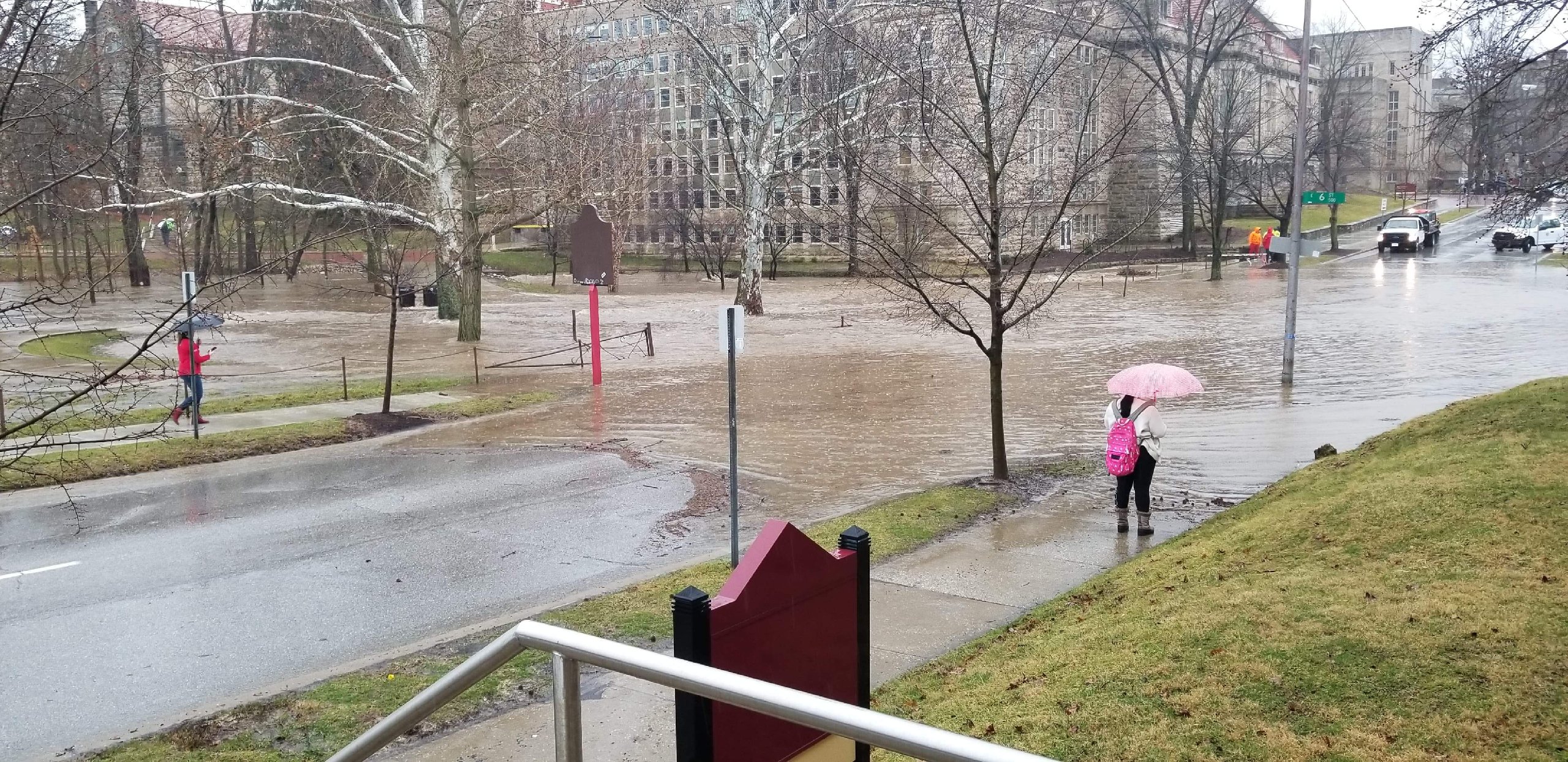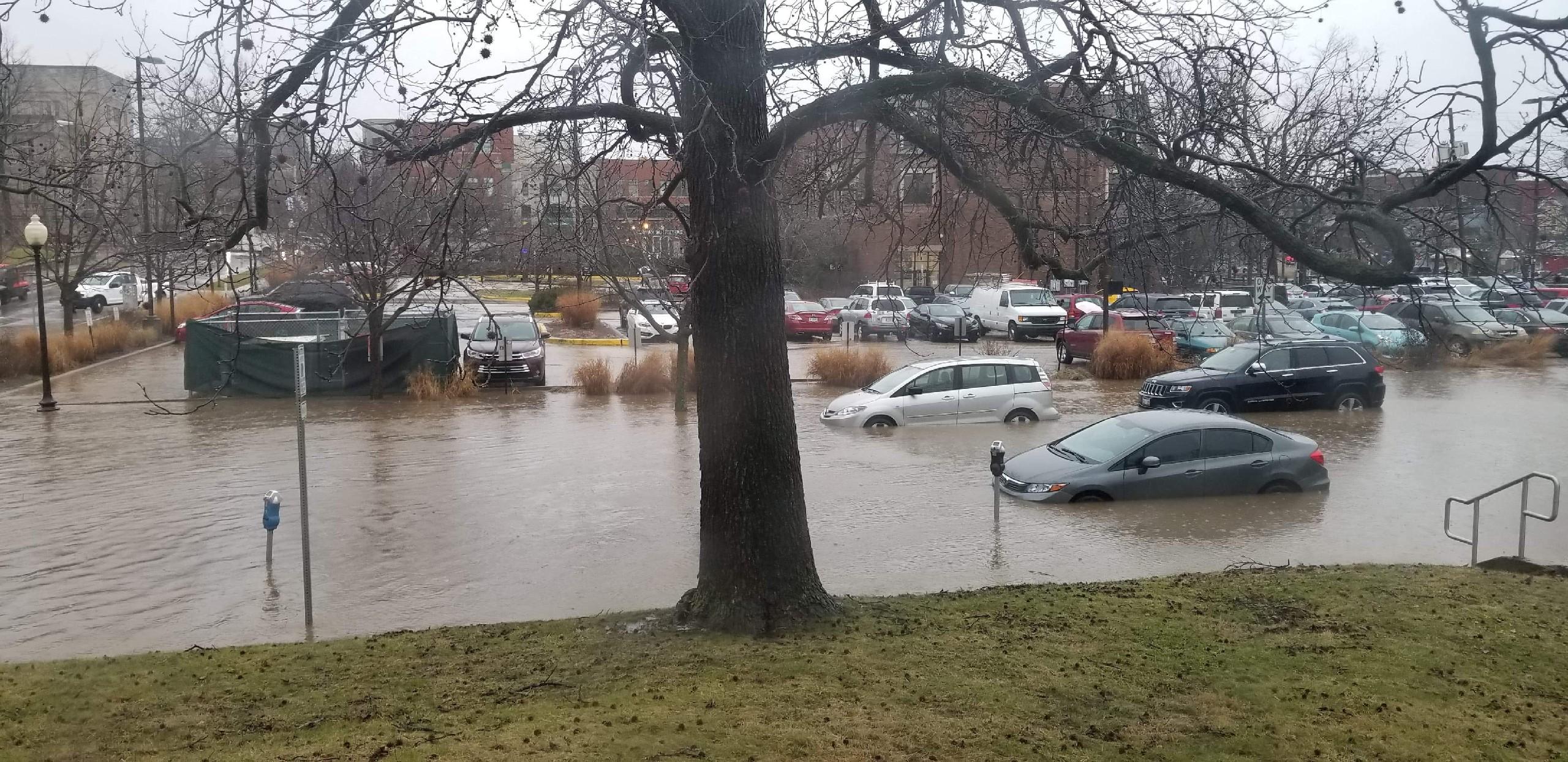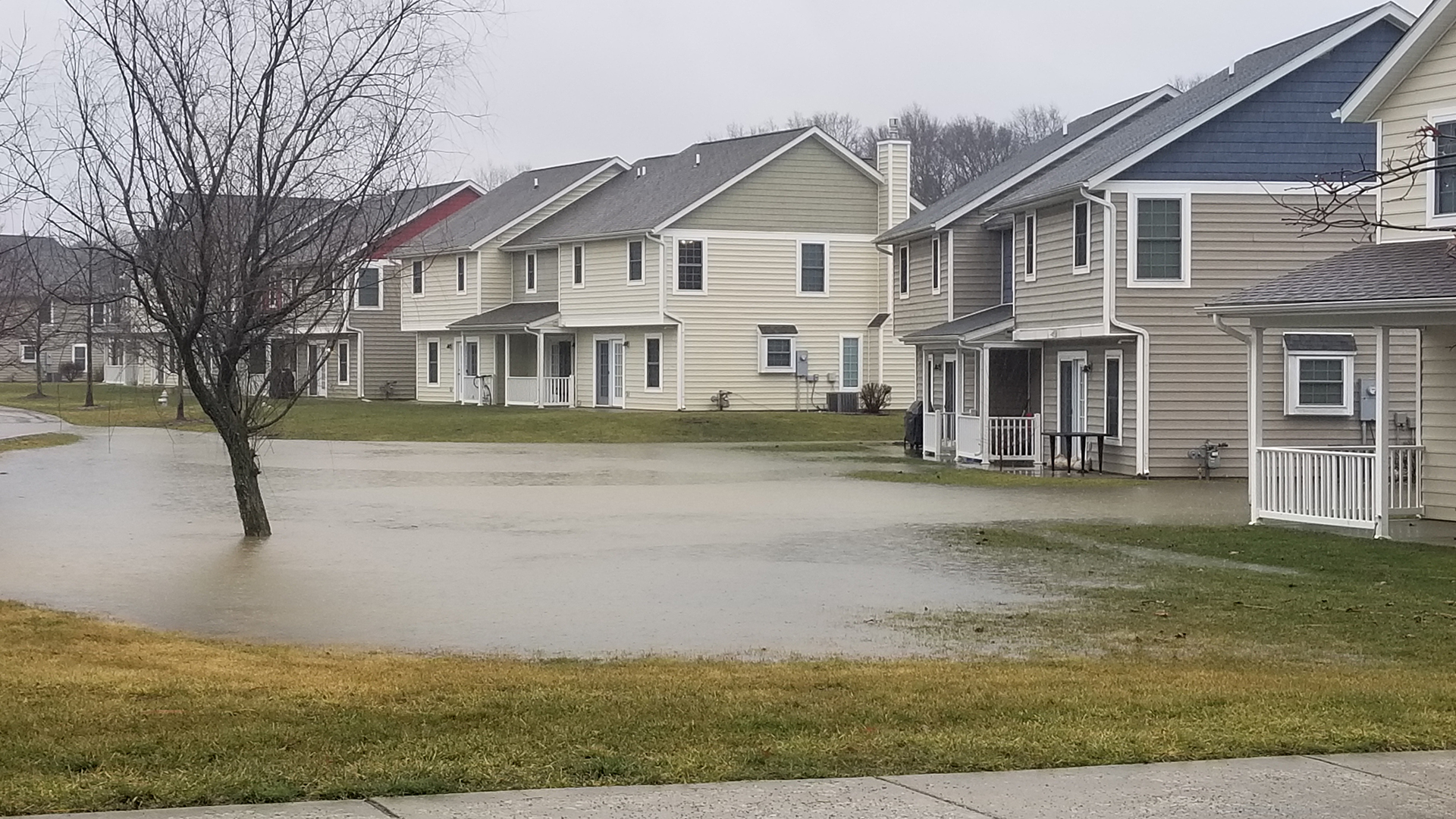
Home Office
Phone:
(812) 337-7637
Address:
Email:
Hours:
Mon. ~ Fri. 8am-5pm
Follow Us:
Address: 5488 E State Rd 46 Bloomington, IN. 47401
Phone: (812) 337-7637
Hours: Mon. ~ Fri. 8am - 5pm
Email:
Phone: (812) 337-7637
Hours: Mon. ~ Fri. 8am - 5pm
Email:
Does my insurance cover me for flood damage?
 Southern Indiana weather is the best. We've had sub-zero temperatures, heavy snowfall then 60 degree weather followed by nearly 6 inches of rain with flooding and just for good measure we threw in a tornado warning. That sounds like a pretty good year of weather, but that was just the last two weeks!
Southern Indiana weather is the best. We've had sub-zero temperatures, heavy snowfall then 60 degree weather followed by nearly 6 inches of rain with flooding and just for good measure we threw in a tornado warning. That sounds like a pretty good year of weather, but that was just the last two weeks!The amount of snow and rain lately has caused a lot of flooding. Water is a very destructive force and causes a lot of damage. This always brings up the question about what your auto and home insurance actually covers. This past week, the flooding happened very quickly. People were at work, came out at lunch and found their car half underwater. If you were lucky enough to have parked on a hill, you may have gone home to a flooded basement.
The following information is from one of our carriers, Allstate, and will hopefully answer your questions. I've broken it down into a couple of sections. The first section talks about automobile insurance, then homeowners insurance and finally flood insurance.
Does Car Insurance Cover Water Damage?
The comprehensive coverage on a car insurance policy helps cover certain types of water damage to your vehicle, depending on the cause. Comprehensive coverage may help pay to repair or replace your vehicle if it's damaged by hail or flooding, for example. It does not cover water damage due to a maintenance issue, like a slow leak or leaving your window open during a rainstorm.
Comprehensive coverage is generally optional, although your lender may require it if you have an auto loan. Here's a look at some potential causes of water damage and how insurance might help.
Is water damage from hailstorms covered by comprehensive insurance?
Hailstorms can lead to water damage if hailstones break your windshield or windows, letting rain and hail into your vehicle. If your vehicle sustains water damage during a hailstorm, comprehensive coverage may help pay to repair your vehicle.
Is flooding covered by Comprehensive insurance?
 During a flood, rising water levels caused by heavy rains may get into your vehicle's engine and interior, potentially causing a lot of damage. Comprehensive coverage typically helps protect your vehicle against flood damage.
During a flood, rising water levels caused by heavy rains may get into your vehicle's engine and interior, potentially causing a lot of damage. Comprehensive coverage typically helps protect your vehicle against flood damage.Are leaks after heavy rains covered by car insurance?
If rains are heavy, it's possible for water to get into your car even if everything is closed up. Imperfect sealing around windows, doors and sunroofs can let water into your car during heavy rains, explains Popular Mechanicsmagazine.
It's your responsibility to keep your vehicle in good condition, and make sure proper repairs are carried out, says the National Association of Insurance Commissioners (NAIC). So if your car is damaged in a single event like a sudden, heavy rainstorm, comprehensive coverage may help cover the damage to your vehicle. But if water slowly leaks into the car because of poor maintenance and causes damage over time, water damage likely won't be covered.
Will water damage be covered by insurance if the windows are left open?
Comprehensive helps cover damage not related to a collision, for events that are out of your control. Comprehensive doesn't cover damage resulting from lack of maintenance or negligence. So if your car's windows were left down, or the sunroof was left open, and rain gets in as a result, any water damage caused by the rain is unlikely to be covered.
Other things to remember
Comprehensive coverage typically doesn't cover water damage to equipment that's not permanently installed in your car, such as removable sound equipment or removable navigation systems, cautions the NAIC.
Comprehensive coverage has a deductible, which is the amount you pay out of pocket toward a covered claim. Also, comprehensive coverage has a limit, which is the maximum amount your policy will pay for a covered claim. If your vehicle is totaled by water damage, comprehensive coverage helps pay to replace your vehicle, up to its depreciated value (called "actual cash value").
Water damage can be frustrating for any car owner, but having comprehensive coverage may help reimburse you if your vehicle is damaged by hail or flooding. Your insurance agent can help you understand your coverage and help you find the policy that's right for you.
Does Homeowners Insurance Cover Water Damage?
 Most homeowners insurance policies help cover water damage if the cause is sudden and accidental. According to the Insurance Information Institute, homeowners insurance may help pay for repairs if, for instance, your drywall is drenched after your water heater ruptures or an upstairs pipe bursts and water saturates the ceiling below.
Most homeowners insurance policies help cover water damage if the cause is sudden and accidental. According to the Insurance Information Institute, homeowners insurance may help pay for repairs if, for instance, your drywall is drenched after your water heater ruptures or an upstairs pipe bursts and water saturates the ceiling below.Depending on what's damaged, two types of coverage within a homeowners insurance policy may apply.
Dwelling Coverage
Dwelling coverage helps pay for damage to the structure of your home if it's damaged by a covered peril. So, if a pipe suddenly bursts and damages a wall, dwelling coverage may help pay for repairs.
Personal Property Coverage
Personal property coverage helps pay for damage to your belongings if they are damaged by a covered risk. So, if a burst pipe results in a drenched computer or bookcase, personal property coverage may help pay to repair or replace the damaged items.
Keep in mind that a deductible will likely apply before your coverage kicks in. Also, coverage limits may apply. Read your policy to brush up on how much coverage your policy provides. Your agent can help you adjust your coverage to fit your needs or answer questions about your policy.
Does homeowners insurance cover water damage from leaking plumbing?
Homeowners insurance may help cover damage caused by leaking plumbing if the leak is sudden and accidental, such as if a washing machine supply hose suddenly breaks or a pipe bursts. However, homeowners insurance does not cover damage resulting from poor maintenance. So, if damage results after you fail to repair a leaky toilet, for example, homeowners insurance likely will not pay for repairs.
What types of water damage are not covered?
Homeowners insurance does not cover certain types of water damage.
Damage from Unresolved Maintenance Issues
While your homeowners insurance will probably help cover the cost of replacing or repairing a damaged floor if your dishwasher suddenly goes on the fritz, coverage generally will not kick in if the damage results from an unresolved maintenance issue, such as continuous leaking near a faucet or other plumbing fixture.
Replacing or Repairing the Source of the Water Damage
Most homeowners insurance policies will not cover the source of the water damage. So, while your policy may cover the cost of tearing out and replacing that damaged floor, you shouldn't expect it to cover the cost of replacing your broken dishwasher or washing machine.
Water Backup from an Outside Sewer or Drain
You also will not typically be covered by a traditional homeowners policy if water backs into your home through an outside sewer or drain. You may, however, be able to purchase additional sewer or water backup coverage that may help cover damage from that type of event.
Flood
No type of flood damage, no matter the source of the water, is covered by standard homeowners policies. Flooding, for example, can occur from storms, over-saturated ground, overflowing or surging bodies of water such as rivers, ponds, lakes and oceans. You may be able to purchase a separate flood insurance policy through the National Flood Insurance Program.
While it's important to keep up with home maintenance to help prevent damage from water, it's also a good idea to check with your agent about what is and isn't covered by your homeowners policy. Be sure to ask if there are any additional coverages available that may be appropriate for your home.
What does flood insurance cover?
So, what may a flood policy help protect? FEMA says you can purchase coverage to help protect your home, your personal belongings, or both. Here are some of the basics for these two types of coverage:
Building property coverage
- What it may help protect: The physical structure of your home and its foundation; plumbing and electrical systems; central air and heating systems; attached bookcases, cabinets and paneling; and a detached garage (other detached structures need their own policy).
- How it typically pays out: Replacement cost basis (what it would take to repair the home in today's dollars) for a primary residence and actual cash value for a vacation home.
- Maximum coverage limit: $250,000 Residential, $500,000 Non-Residential
- What it may help protect: Clothing, furniture and electronics; curtains; some portable appliances; freezers and the foods within them; and certain valuables like art (up to a specified limit).
- How it typically pays out: Actual cash value basis (takes depreciation into account).
- Maximum coverage limit: $100,000
Equally important is knowing what's not covered by flood insurance. Here are some of the types of property and expenses that fall outside the scope of a basic flood insurance policy, according to the NFIP's summary of coverage:
- Moisture or mold/mildew damage that "could have been avoided by the homeowner"
- Currency, precious metals, and paper valuables like stock certificates
- Outdoor property such as decks, fences, patios, landscaping, wells and septic systems, and hot tubs and pools
- Living expenses, like temporary housing (if flood damage deems your home uninhabitable)
- Cars and other self-propelled vehicles (but your auto insurance may offer some coverage for your car)
Talk to an agent to help make sure you're clear about the coverage details of a flood insurance policy and to help you make the right choices for your situation. Of course, you should also remember that a flood isn't the only potential source of water damage to a home. That's why, in addition to understanding the potential benefits of flood insurance, you should also review the coverages offered by your homeowners insurance policy.
Armed with the knowledge and insurance coverages that are right for you, you'll go a long way toward protecting your home against water damage.
About Us
We are an independent agency providing for all your insurance needs in one place. Our personnel brings over 84 years of combined experience to help you improve your insurance situations and fulfill your needs.
We are a member of the PROES Business Group. This association is a family of companies providing multiple avenues to make your life better. It brings business partners with the right background, experience and expertise to help you with your needs.
Each agent, servicing representative and owner’s philosophy is to combine quality, price, experience and service in every facet of your insurance purchasing experience. We strive to build long term relationships by meeting the needs of our clients.
The various backgrounds of our people help assure we can relate to your situation. Our goal is to help you have the right coverage, at the right price and be satisfied at the most important time – when you have a claim. We understand you are not buying insurance: you are buying piece of mind to protect yourself, your business and your family.
We are a member of the PROES Business Group. This association is a family of companies providing multiple avenues to make your life better. It brings business partners with the right background, experience and expertise to help you with your needs.
Each agent, servicing representative and owner’s philosophy is to combine quality, price, experience and service in every facet of your insurance purchasing experience. We strive to build long term relationships by meeting the needs of our clients.
The various backgrounds of our people help assure we can relate to your situation. Our goal is to help you have the right coverage, at the right price and be satisfied at the most important time – when you have a claim. We understand you are not buying insurance: you are buying piece of mind to protect yourself, your business and your family.